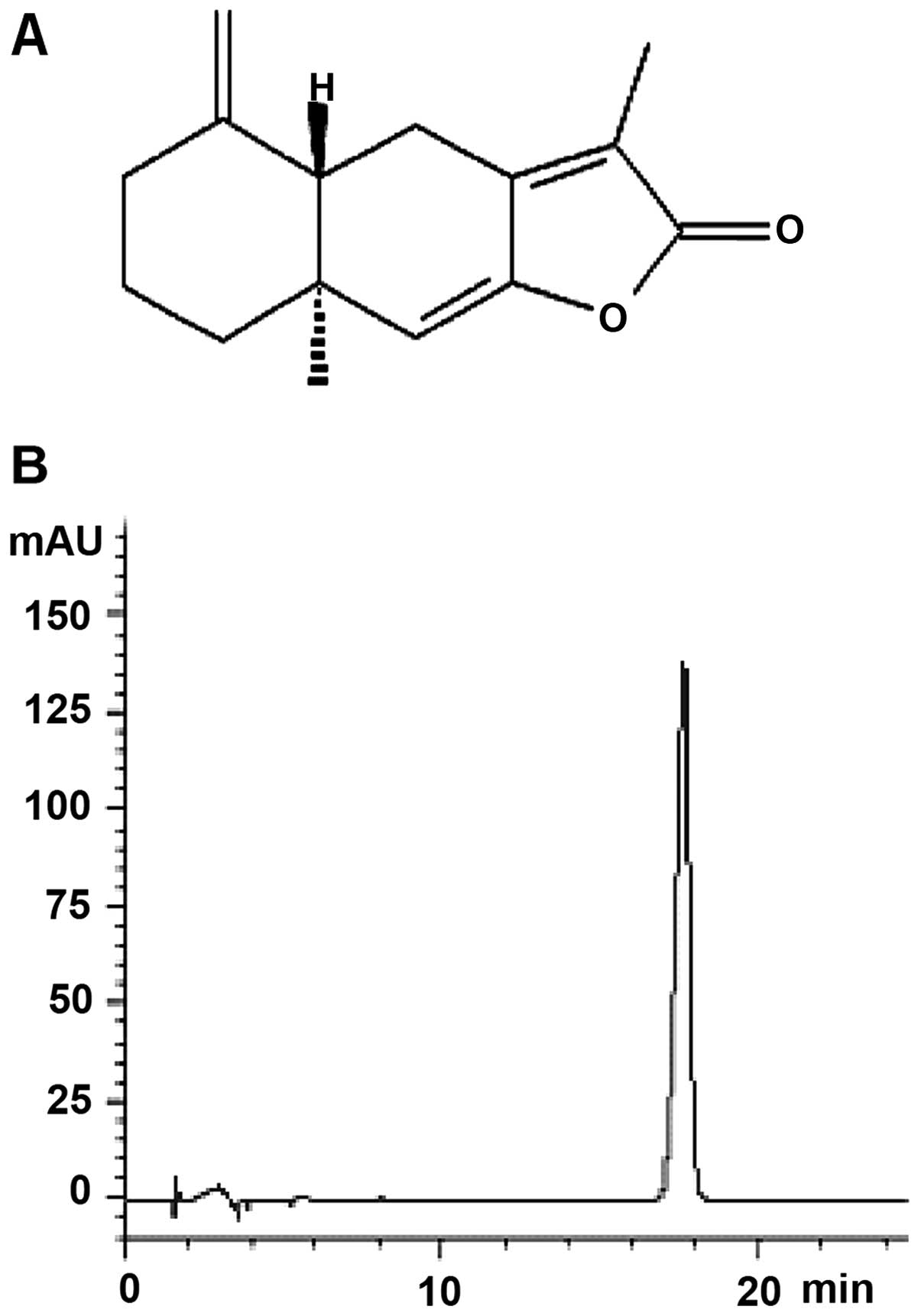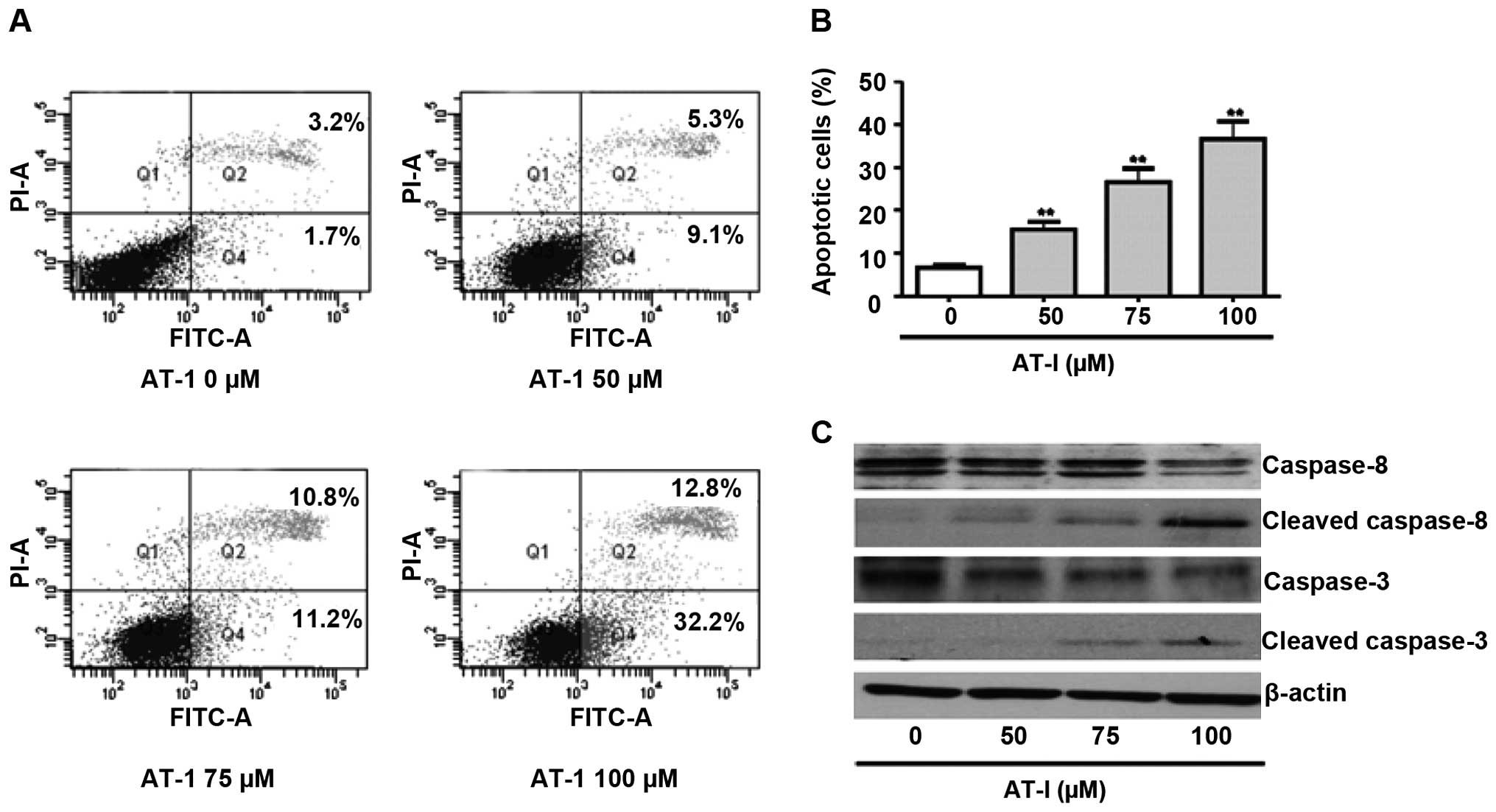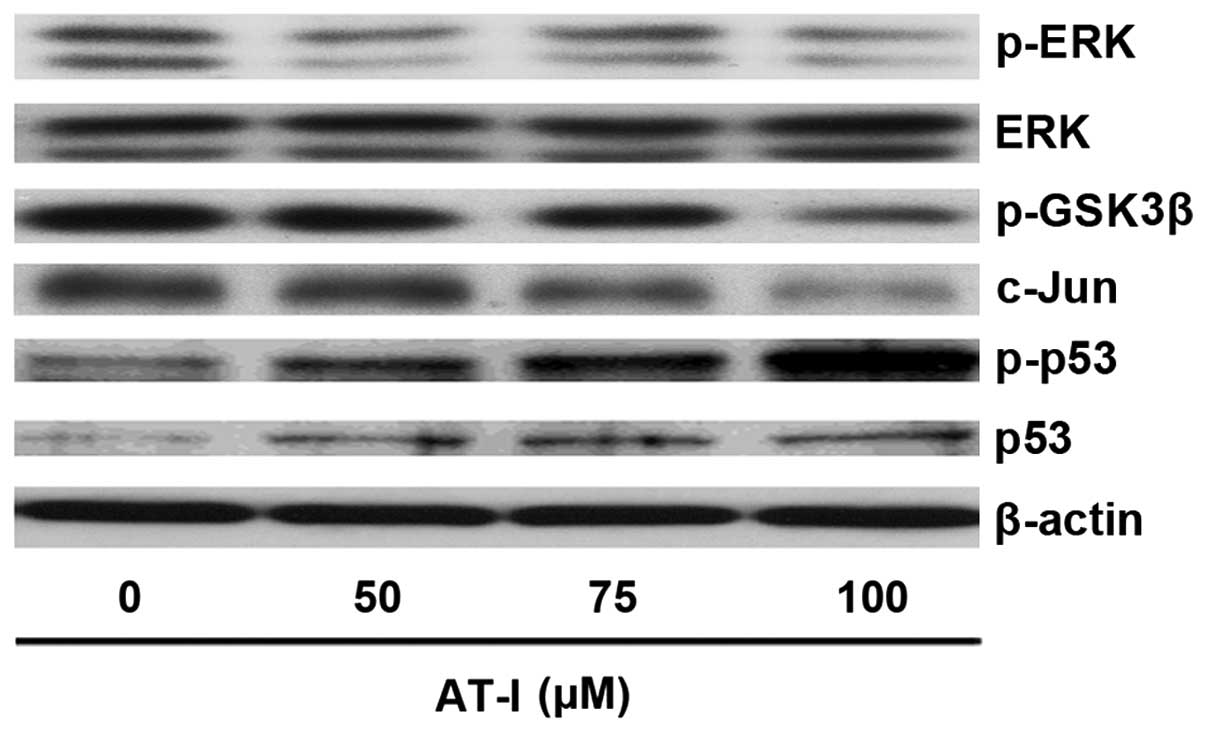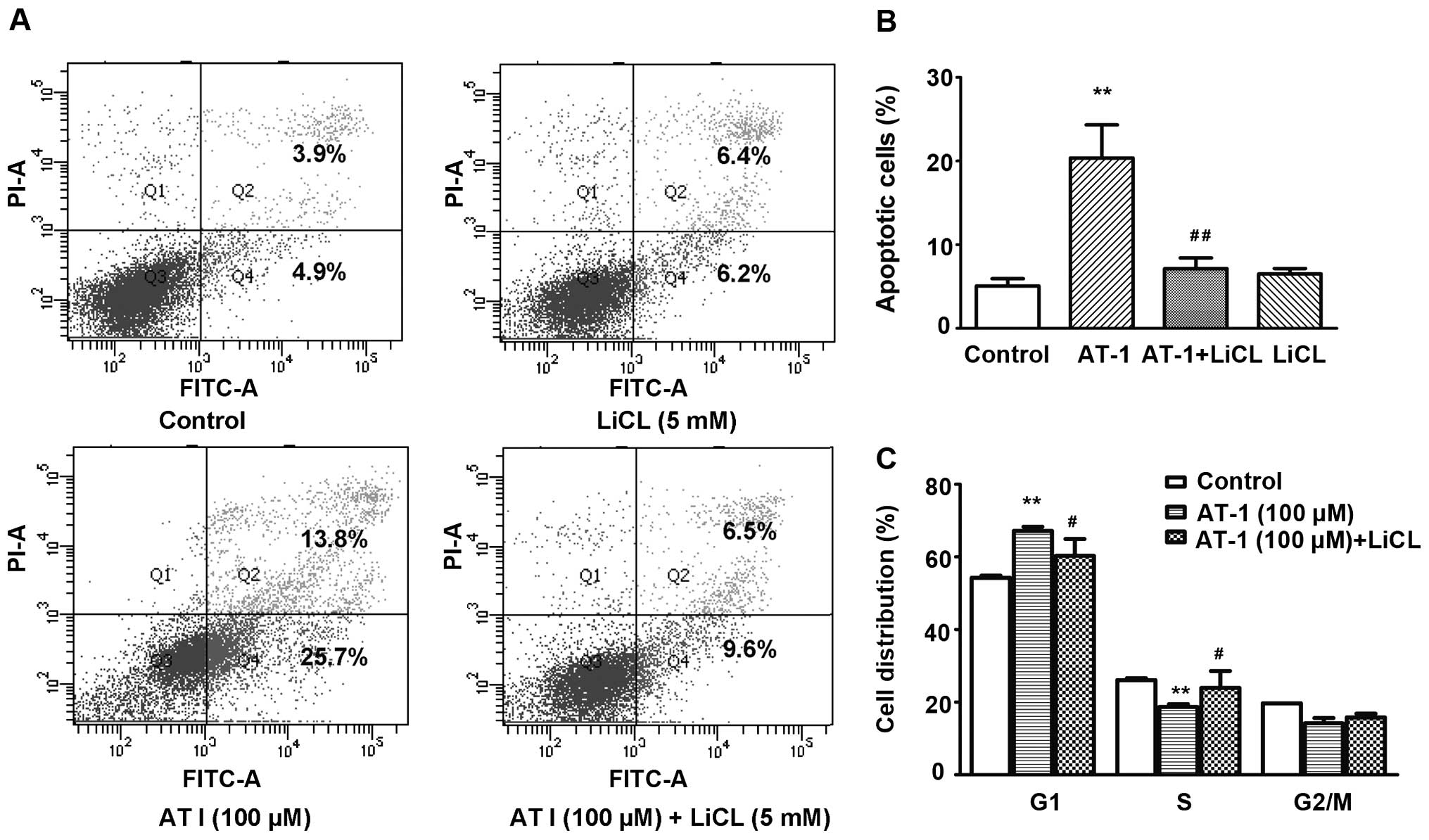|
1
|
Sladden MJ, Balch C, Barzilai DA, Berg D,
Freiman A, Handiside T, Hollis S, Lens MB and Thompson JF: Surgical
excision margins for primary cutaneous melanoma. Cochrane Database
Syst Rev. pp. CD0048352009, View Article : Google Scholar
|
|
2
|
Hodi FS, O'Day SJ, McDermott DF, Weber RW,
Sosman JA, Haanen JB, Gonzalez R, Robert C, Schadendorf D, Hassel
JC, et al: Improved survival with ipilimumab in patients with
metastatic melanoma. N Engl J Med. 363:711–723. 2010. View Article : Google Scholar : PubMed/NCBI
|
|
3
|
Robert C, Thomas L, Bondarenko I, O'Day S,
Weber J, Garbe C, Lebbe C, Baurain JF, Testori A, Grob JJ, et al:
Ipilimumab plus dacarbazine for previously untreated metastatic
melanoma. N Engl J Med. 364:2517–2526. 2011. View Article : Google Scholar : PubMed/NCBI
|
|
4
|
Flaherty KT, Puzanov I, Kim KB, Ribas A,
McArthur GA, Sosman JA, O'Dwyer PJ, Lee RJ, Grippo JF, Nolop K, et
al: Inhibition of mutated, activated BRAF in metastatic melanoma. N
Engl J Med. 363:809–819. 2010. View Article : Google Scholar : PubMed/NCBI
|
|
5
|
Kudchadkar RR, Gonzalez R and Lewis K: New
targeted therapies in melanoma. Cancer Control. 20:282–288.
2013.PubMed/NCBI
|
|
6
|
Bauer BA: Herbal therapy: What a clinician
needs to know to counsel patients effectively. Mayo Clin Proc.
75:835–841. 2000. View
Article : Google Scholar : PubMed/NCBI
|
|
7
|
Endo K, Taguchi T, Taguchi F, Hikino H,
Yamahara J and Fujimura H: Antiinflammatory principles of
Atractylodes rhizomes. Chem Pharm Bull (Tokyo). 27:2954–2958. 1979.
View Article : Google Scholar
|
|
8
|
Kiso Y, Tohkin M and Hikino H: Mechanism
of antihepatotoxic activity of atractylon, I: Effect on free
radical generation and lipid peroxidation. Planta Med. 51:97–100.
1985. View Article : Google Scholar
|
|
9
|
Mori H, Xu Q, Sakamoto O, Uesugi Y, Koda A
and Nishioka I: Mechanisms of antitumor activity of aqueous
extracts from Chinese herbs: Their immunopharmacological
properties. Jpn J Pharmacol. 49:423–431. 1989. View Article : Google Scholar : PubMed/NCBI
|
|
10
|
Kang TH, Bang JY, Kim MH, Kang IC, Kim HM
and Jeong HJ: Atractylenolide III, a sesquiterpenoid, induces
apoptosis in human lung carcinoma A549 cells via
mitochondria-mediated death pathway. Food Chem Toxicol. 49:514–519.
2011. View Article : Google Scholar
|
|
11
|
Yan Ye, Chou GX, Hui Wang, Chu JH, Fong WF
and Yu ZL: Effects of sesquiterpenes isolated from largehead
atractylodes rhizome on growth, migration, and differentiation of
B16 melanoma cells. Integr Cancer Ther. 10:92–100. 2011. View Article : Google Scholar
|
|
12
|
el-Deiry WS, Tokino T, Velculescu VE, Levy
DB, Parsons R, Trent JM, Lin D, Mercer WE, Kinzler KW and
Vogelstein B: WAF1, a potential mediator of p53 tumor suppression.
Cell. 75:817–825. 1993. View Article : Google Scholar : PubMed/NCBI
|
|
13
|
Ehrhardt H, Häcker S, Wittmann S, Maurer
M, Borkhardt A, Toloczko A, Debatin KM, Fulda S and Jeremias I:
Cytotoxic drug-induced, p53-mediated upregulation of caspase-8 in
tumor cells. Oncogene. 27:783–793. 2008. View Article : Google Scholar
|
|
14
|
Watcharasit P, Bijur GN, Zmijewski JW,
Song L, Zmijewska A, Chen X, Johnson GV and Jope RS: Direct,
activating interaction between glycogen synthase kinase-3beta and
p53 after DNA damage. Proc Natl Acad Sci USA. 99:7951–7955. 2002.
View Article : Google Scholar : PubMed/NCBI
|
|
15
|
Eom TY, Roth KA and Jope RS: Neural
precursor cells are protected from apoptosis induced by trophic
factor withdrawal or genotoxic stress by inhibitors of glycogen
synthase kinase 3. J Biol Chem. 282:22856–22864. 2007. View Article : Google Scholar : PubMed/NCBI
|
|
16
|
Schreiber M, Kolbus A, Piu F, Szabowski A,
Möhle-Steinlein U, Tian J, Karin M, Angel P and Wagner EF: Control
of cell cycle progression by c-Jun is p53 dependent. Genes Dev.
13:607–619. 1999. View Article : Google Scholar : PubMed/NCBI
|
|
17
|
Lopez-Bergami P, Huang C, Goydos JS, Yip
D, Bar-Eli M, Herlyn M, Smalley KS, Mahale A, Eroshkin A, Aaronson
S, et al: Rewired ERK-JNK signaling pathways in melanoma. Cancer
Cell. 11:447–460. 2007. View Article : Google Scholar : PubMed/NCBI
|
|
18
|
Sherr CJ and Roberts JM: CDK inhibitors:
Positive and negative regulators of G1-phase progression. Genes
Dev. 13:1501–1512. 1999. View Article : Google Scholar : PubMed/NCBI
|
|
19
|
Shao J, Teng Y, Padia R, Hong S, Noh H,
Xie X, Mumm JS, Dong Z, Ding HF, Cowell J, et al: COP1 and GSK3β
cooperate to promote c-Jun degradation and inhibit breast cancer
cell tumorigenesis. Neoplasia. 15:1075–1085. 2013. View Article : Google Scholar : PubMed/NCBI
|
|
20
|
Dihlmann S, Klein S and Doeberitz Mv Mv:
Reduction of beta-catenin/T-cell transcription factor signaling by
aspirin and indomethacin is caused by an increased stabilization of
phosphorylated beta-catenin. Mol Cancer Ther. 2:509–516.
2003.PubMed/NCBI
|
|
21
|
Gao Y, Liu Z, Zhang X, He J, Pan Y, Hao F,
Xie L, Li Q, Qiu X and Wang E: Inhibition of cytoplasmic GSK-3β
increases cisplatin resistance through activation of Wnt/β-catenin
signaling in A549/DDP cells. Cancer Lett. 336:231–239. 2013.
View Article : Google Scholar : PubMed/NCBI
|
|
22
|
Novetsky AP, Thompson DM, Zighelboim I,
Thaker PH, Powell MA, Mutch DG and Goodfellow PJ: Lithium chloride
and inhibition of glycogen synthase kinase 3β as a potential
therapy for serous ovarian cancer. Int Gynecol Cancer. 23:361–366.
2013. View Article : Google Scholar
|
|
23
|
Grimaldi AM, Cassidy PB, Leachmann S and
Ascierto PA: Novel approaches in melanoma prevention and therapy.
Cancer Treat Res. 159:443–455. 2014. View Article : Google Scholar
|
|
24
|
el-Deiry WS, Harper JW, O'Connor PM,
Velculescu VE, Canman CE, Jackman J, Pietenpol JA, Burrell M, Hill
DE, Wang Y, et al: WAF1/CIP1 is induced in p53-mediated G1 arrest
and apoptosis. Cancer Res. 54:1169–1174. 1994.PubMed/NCBI
|
|
25
|
Toyoshima H and Hunter T: p27, a novel
inhibitor of G1 cyclin-Cdk protein kinase activity, is related to
p21. Cell. 78:67–74. 1994. View Article : Google Scholar : PubMed/NCBI
|
|
26
|
Peter M and Herskowitz I: Joining the
complex: Cyclin-dependent kinase inhibitory proteins and the cell
cycle. Cell. 79:181–184. 1994. View Article : Google Scholar : PubMed/NCBI
|
|
27
|
Ashkenazi A and Dixit VM: Death receptors:
Signaling and modulation. Science. 281:1305–1308. 1998. View Article : Google Scholar : PubMed/NCBI
|
|
28
|
Doble BW and Woodgett JR: GSK-3: Tricks of
the trade for a multi-tasking kinase. J Cell Sci. 116:1175–1186.
2003. View Article : Google Scholar : PubMed/NCBI
|
|
29
|
Jope RS and Johnson GV: The glamour and
gloom of glycogen synthase kinase-3. Trends Biochem Sci. 29:95–102.
2004. View Article : Google Scholar : PubMed/NCBI
|
|
30
|
Jope RS, Yuskaitis CJ and Beurel E:
Glycogen synthase kinase-3 (GSK3): Inflammation, diseases, and
therapeutics. Neurochem Res. 32:577–595. 2007. View Article : Google Scholar :
|
|
31
|
Liu Y, Ye F, Qiu GQ, Zhang M, Wang R, He
QY and Cai Y: Effects of lactone I from Atractylodes macrocephala
Koidz on cytokines and proteolysis-inducing factors in cachectic
cancer patients. Di Yi Jun Yi Da Xue Xue Bao. 25:1308–1311. 2005.In
Chinese. PubMed/NCBI
|
|
32
|
Liu Y, Jia Z, Dong L, Wang R and Qiu G: A
randomized pilot study of atractylenolide I on gastric cancer
cachexia patients. Evid Based Complement Altemat Med. 5:337–344.
2008. View Article : Google Scholar
|
|
33
|
Wang C, Wang S, Chen Q and He L: A
capillary gas chromatography-selected ion monitoring mass
spectrometry method for the analysis of atractylenolide I in rat
plasma and tissues, and application in a pharmacokinetic study. J
Chromatogr B Analyt Technol Biomed Life Sci. 863:215–222. 2008.
View Article : Google Scholar : PubMed/NCBI
|



















